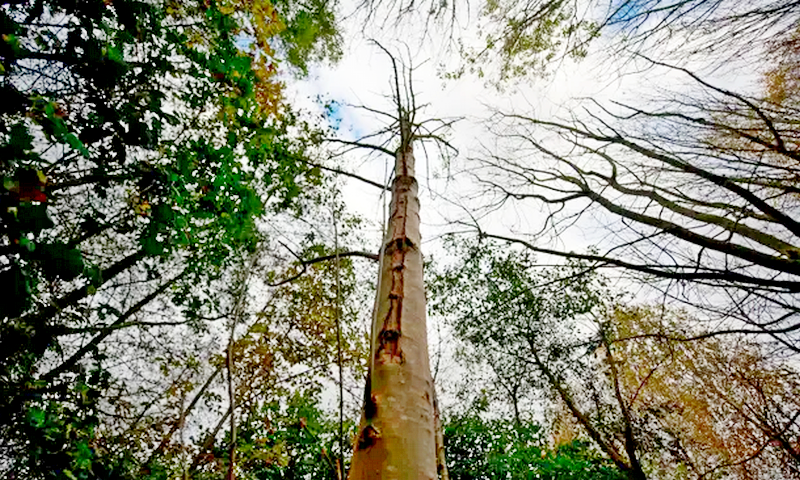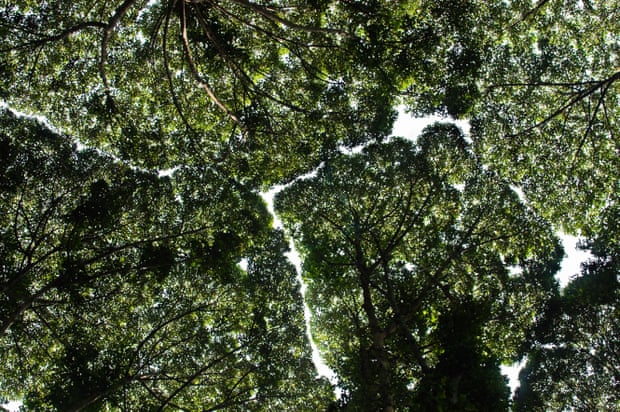Prevent tree extinctions or face global ecological catastrophe, scientists warn

The age of extinction is supported by

The Guardian - Graeme Green - Fri 2 Sep 2022 12.04 BST
A new paper issues a warning to humanity as it calls for urgent action to protect the world’s 60,000 tree species. Scientists have issued an urgent “warning to humanity” about the global impact of tree extinctions.
A new paper predicts severe consequences for people, wildlife, and the planet’s ecosystems if the widespread loss of trees continues. “Last year, we published the State of the World’s Trees report, where we showed at least 17,500 tree species, about a third of the world’s 60,000 tree species, are at risk of extinction,” said Malin Rivers, lead author of the paper and head of conservation prioritization at Botanic Gardens Conservation International (BGCI). “Now we want to highlight why it matters that so many tree species are going extinct.
“Without acting now, it will impact humanity, our economies, and livelihoods. Ecologically, it will have a catastrophic impact on the planet.”
The joint warning from BGCI and the Global Tree Specialist Group of the International Union for Conservation of Nature’s species survival commission (IUCN SSC) is backed by 45 scientists from more than 20 countries, including the UK, the US, India, and Haiti, with calls for action signed by more than 30 organizations, including botanic gardens, arboretums, and universities.
According to the paper, the world’s forests contribute $1.3tn (£1.1tn) to the global economy. Timber is the most valuable commodity, but non-timber products, such as fruit, nuts, and medicine, create $88bn in global trade. Of the fruit available for global consumption, 53% comes from trees.

Globally, more than 1.6 billion people live within 5km (3 miles) of a forest and rely on them for jobs and money. In developing countries, forests provide up to 25% of household income.
“Some people live in the forest and use it for subsistence, for food, shelter and medicine,” Rivers said. “Many more people use forests for their income, to sell things they collect or make from the forest. All those people will be directly impacted by tree losses. A lot of trees also have special spiritual or cultural meanings. When those tree species are lost, that cultural heritage is also lost, like the dragon’s blood trees in Yemen, or baobabs in Madagascar.”
The large-scale extinction of tree species would lead to major biodiversity losses. Half of the world’s animal and plant species rely on trees as their habitat, with forests containing about 75% of bird species, 68% of mammal species, and as many as 10 million species of invertebrates. Forest-dependent species have already declined by about 53% since 1970. “When we look at extinction risks for mammals or birds, underlying that is habitat loss, and habitat loss is often tree loss,” said Rivers. “If we don’t look after trees, there’s no way we can look after all the other life there.”
The extinction of a single tree species can significantly alter an ecosystem, causing a domino effect on its ability to function. When eucalyptus and dipterocarp trees are destroyed, for example, forests are more at risk from fire, pests, and disease.

Forests provide 50% of the world’s carbon storage, so further tree extinctions would reduce our ability to fight climate breakdown. “The new thing in this paper is that it’s the diversity of trees that is so important,” said Rivers. “We’re showing that diverse forests store more carbon than monocultures. That’s true for many of the ecological functions, not just carbon capture, but providing habitat to animals, soil stabilization, resilience to pests and diseases, and resilience to storms and adverse weather. By losing tree diversity, we’ll also lose diversity in all organisms: birds, animals, fungi, micro-organisms, insects.”
More than 100 tree species are already extinct in the wild, but despite their importance, billions of trees are still being lost each year to pests, disease, invasive species, drought, climate breakdown, and industrial-scale deforestation for wood, cattle-farming, palm oil, and other agriculture, from tropical islands to species-rich areas, such as the Amazon and Borneo.
Ahead of the UN’s Cop15 biodiversity conference in Montreal this December, the scientists behind the paper are calling for more protection for the world’s trees, including strengthening the role of trees in environmental and climate policy at the state level.
“We want to see action,” said Rivers. “We can all take responsibility for the beef we’re eating and where it’s coming from, and making sure tree products are sustainably sourced. But we also want to see governments take responsibility, so there’s joined-up thinking on biodiversity, climate change, and other issues.”
Find more age of extinction coverage here, and follow biodiversity reporters Phoebe Weston and Patrick Greenfield on Twitter for all the latest news and features topics
Editors Comments:


HUMAN SYNTHESIS
COPYRIGHTS
Copy & Paste the link above for Yandex translation to Norwegian.
WHO and WHAT is behind it all? : >
The bottom line is for the people to regain their original, moral principles, which have intentionally been watered out over the past generations by our press, TV, and other media owned by the Illuminati/Bilderberger Group, corrupting our morals by making misbehavior acceptable to our society. Only in this way shall we conquer this oncoming wave of evil.
All articles contained in Human-Synthesis are freely available and collected from the Internet. The interpretation of the contents is left to the readers and does not necessarily represent the views of the Administrator. Disclaimer: The contents of this article are the sole responsibility of the author(s). Human-Synthesis will not be responsible for any inaccurate or incorrect statement in this article. Human-Synthesis grants permission to cross-post original Human-Synthesis articles on community internet sites as long as the text & title are not modified.
HUMAN SYNTHESIS